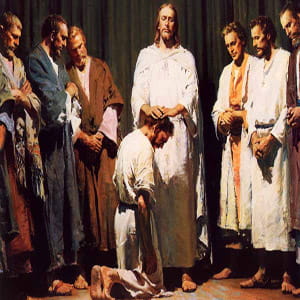 As the video we offered in our initial post ("Shaping Students with the Character and Competency of Christ") sought to illustrate, in accommodating itself to the assumptions and characteristics of Christendom, the Church lost its vision of God as a missionary God. This loss of a vision of the missio Dei, we argue, resulted in the development of a version of the Gospel that divorced itself from discipleship. The consequences were grave not only for our ecclesiology, but also for the shape and practice of our systems of theological education, which sought to prepare leaders for these Christendom-shaped churches.
As the video we offered in our initial post ("Shaping Students with the Character and Competency of Christ") sought to illustrate, in accommodating itself to the assumptions and characteristics of Christendom, the Church lost its vision of God as a missionary God. This loss of a vision of the missio Dei, we argue, resulted in the development of a version of the Gospel that divorced itself from discipleship. The consequences were grave not only for our ecclesiology, but also for the shape and practice of our systems of theological education, which sought to prepare leaders for these Christendom-shaped churches.
As we consider these consequences and labor together to plot out a faithful trajectory for the future of theological education, we suggest that the task before us is to identify educational principles guided by a theological vision of the missio Dei as it relates to both the gospel and the Church that can shape the processes of theological formation and help students develop Kingdom-oriented character and competency. The question, after all, is not whether seminaries and their programs are formational. They always are. The more appropriate and pressing question is, "Are our seminaries and their programs helping students become more like Jesus, both personally and ministerially, as they seek to serve faithfully as Kingdom leaders?"
Unfortunately, the answer appears to be negative. Besides the plethora of anecdotal and qualitative evidence we could cite, this reality is also attested by the fact that 75 percent of pastors say they feel "unqualified or poorly trained by their seminaries" to lead their churches.
We will explore in forthcoming installments two additional missiological principles that, we believe, ought to guide this vision of theological education. Here we suggest that a vision of theological education that is guided and shaped by a missional vision of God, the Gospel, and the Church will be praxeological—given to the training of reflective practitioners.
Whereas theological education within Christendom has been largely theoretical, imparting vast amounts of ideas and information into the minds of seminary students and then turning them loose to attempt to apply that information to a ministry context after they graduate, we suggest that a Kingdom-oriented vision of theological education compels us to train reflective practitioners whose learning and formation take place praxeologically. While other changes are surely necessary, we suggest that praxeological theological formation calls for elongated programs, training by missionary theologians, diversified learning environments, a high degree of attention to contextualization, and an emphasis on creating learning communities.
Elongated Programs of Theological Formation
Whereas many seminaries seem to be spending their energy trying to find ways to help students achieve degrees more quickly, a praxeological orientation calls for more integrated, and therefore elongated, programs. Obviously an elongated program delays the conferral of a degree, but under the vision of theological education suggested here, the idea isn't getting a degree so that you can begin to do ministry, but beginning to do ministry so that you are rooted in the proper context for theological education and formation in the first place. If the end goal is not the conferral of a degree but actually becoming a certain kind of person, there simply are no shortcuts to be taken.
Training by Missionary Theologians
A praxeological orientation toward theological education will require a faculty composed not mainly of traditional academic scholars, but of missionary theologians—those whose ability to guide and shape others flows from their own praxeological formation. Again, we are not suggesting that scholarship does not have its place; we are simply saying that the right kind of scholarship will always be driven by and focused on its implications for the life and ministry of the Church. As Karl Barth has famously said, "There would be no theology if there were no ministry specially committed to the witness of the Word . . . If we abstract its origin in the ministry of the community, all its problems are either irrelevant or they lose their theological character . . ." (Church Dogmatics 4.3.2, p. 879). So we are compelled to ask whether or not those who are trained and formed by traditional Ph.D. programs are the best candidates for the kind of mentors/teachers needed to equip those who embrace this vision of theological education.




